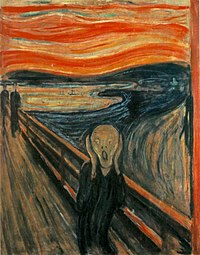
Photo from wikipedia
Metacognitive theory of emotional disorders (Matthews and Wells, 1994; Wells, 2009) suggests that metacognitive beliefs can play a causal role in the development and maintenance of anxiety symptoms. In this… Click to show full abstract
Metacognitive theory of emotional disorders (Matthews and Wells, 1994; Wells, 2009) suggests that metacognitive beliefs can play a causal role in the development and maintenance of anxiety symptoms. In this prospective study, we examine the relationships between metacognitive beliefs, perceived stress and anxiety in a non-clinical sample. Participants were 135 undergraduate students who completed a battery of questionnaire at two time points (3- months apart). Results revealed metacognitive beliefs do not predict long-term anxiety independently. However, moderation analyses demonstrated negative beliefs about uncontrollability and danger prospectively moderated the relationship between perceived stress and Time 2 anxiety. Negative metacognitive beliefs also interacted with baseline anxiety to predict the change in anxiety symptoms. The results confirm metacognitions play a causal role in anxiety and have implications for cognitive models and the treatment of anxiety.
Journal Title: Psychiatry Research
Year Published: 2017
Link to full text (if available)
Share on Social Media: Sign Up to like & get
recommendations!